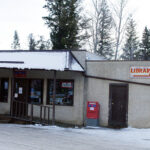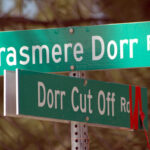Home »

I thank Cassie Brown for her work
Book Review
By Derryll White
 Brown, Cassie (1972). Death On the Ice.
Brown, Cassie (1972). Death On the Ice.
This book was given to me by a friend from Newfoundland. “This is as close as I can get to telling you what it was like before Joey sold us out,” he said. He is a member of the Newfoundland Liberation Army and has strong feelings.
So, it’s an old book and it’s a tragedy. Seventy-eight sealers died on the ice in 1914, long before Brigette Bardot and the international cause célèbre over the harvest of seal pups. But I had a feeling the book had to be about more than just an historical tragedy. My friend had fire in his eyes when he gave me the book.
Well, my intuition was right. The first sentence hints at the exploitation of the working class by wealthy St. John’s merchants. So, this is a story of usury, of the depths man will go to in order to wrest from his fellows wealth and power. It is also a story about how Newfoundlanders began to revolt against feudal working conditions and the unbridled powers of the moneyed class. Right from the start the book signals that Newfoundlanders may have been a simple, hardworking people – but stupid, no! The facts are unequivocal, sifted from court records.
The seal hunt was the supreme test of manhood for young Newfoundlanders. Young men of 15 and 16 jockeyed for positions on the old schooners of the sealing fleet headed out to the ice. All wanted to go “swilling” to prove themselves, their manhood, and make some cash money.
Brown points out early in the book that nature has not been kind to Newfoundland. There is no moderating Gulf Stream and only minimal growing conditions. For five centuries Newfoundland men have turned to the sea for a living. Harp seal pups have been a part of that existence as surely as codfish. Newfoundlanders killed and ate the pups, rendered the fat for lamp oil and soap, used the hides for boots and clothing.
Perhaps no one in Canada today comprehends the culture of usury, work and privation that formed the Newfoundland world. Men were literally indentured to corporations. Women worked doggedly at home to raise a small garden and make do for the children, who then assumed a man or woman’s role at 14 or 15. These were a hardy, proud people, accepting a brutal ocean as their birth right and hard work as their due. They knew how to work together and spoke a language different from the rest of Canada, nurtured for hundreds of years in small outport communities.
Newfoundlanders were, as ‘Death On the Ice’ attests, a strong people who backed away from nothing. When Joey Smallwood brought the Newfoundland nation into Canada in March of 1949, Canada was definitely the better for it. This book clearly indicates that denizens of ‘the Rock’ are representative of the best that we can hope to be as a nation.
This is a tough book to read. Those who hold commerce above all else perhaps should not try. It pulls no punches in attesting to the fact that the biggest thief is the most important and powerful man. It also, however, talks in very moving terms about how a culture of respect and loyalty is crafted among working men. I personally thank Cassie Brown for her work in putting this story together. This is not a history that was taught in school. I now understand my Newfoundland friends and acquaintances much better and realize that the Newfoundland Liberation Army is a force that all thinking Canadians might think seriously about endorsing. I strongly suggest that you read this book, old as it is.
********
Excerpts from the book
SEALING: It was a terrible business in which men lived and worked like dogs, sacrificed their ships as a matter of course, and often died on or under the ice pans.
WEALTH: The aristocracy of the island, the merchant families of Water Street, had first made their money from trade in fish and later from trade in seal hides and fat…. On the island they ran everything.
SOCIAL REALITY: It was as if the entire island was a ‘company town’ and every store a company store – with the men of Water Street quite content to keep things that way.
CLASS: That was the system. The fishery brought greater wealth to the wealthy and a bare existence to the masses. Because generation after generation was born to poverty and incredible hardship and died in the same circumstances, the fishermen accepted the system. They were a hardy, manly breed.
EXPOSURE: Numbness gripped even the liveliest, and two strapping young men who laughingly had wrestled strenuously earlier were now reeling from exhaustion. They finally fell to the ice, unable to keep going.
FAMILY: …the first grey light revealed many still bodies. Among them were … Edward Tippett and his two sons, Norman and Abel. Tippett’s arms were frozen around his sons’ bodies and they still huddled close to him in death. They stood like pieces of sculpture, planted solidly on the ice in a standing embrace, the drifting snow swirling around them.
LAST WORD – …thus pay some reasonable respect to the many dead, who through no fault of theirs had been called upon to sacrifice their lives upon the frozen floe, after enduring the most excruciating torture.
But even this small token of respect was denied our almost assassinated countrymen. They were only toilers in the innermost thought of the slave owners; “let us take it quietly and the whole thing will blow over in a few days.”
CAPITAL SPEAKS – “Decision as to prospects getting more seals must be left to the captain. Please don’t interfere. JOB”
WORKER’S ANSWER – “But the object of the appeal was to have the sixty-nine sealers’ bodies escorted to port, in a national manner, comparable with the respect which the whole fleet consider was due to the seventy-seven men who died in an endeavour to secure wealth to maintain their country, and whose lives were sacrificed for greed of gold.”
 – Derryll White once wrote books but now chooses to read and write about them. When not reading he writes history for the web at www.basininstitute.org .
– Derryll White once wrote books but now chooses to read and write about them. When not reading he writes history for the web at www.basininstitute.org .







